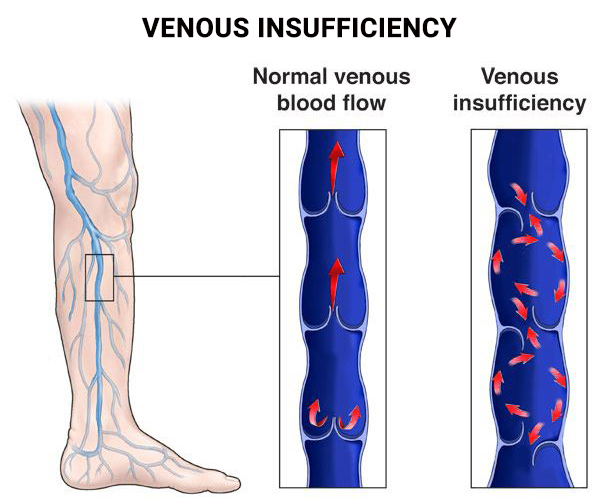Seek medical assistance if you notice swelling on your legs from knee down, tightening socks, or feel the pants getting snug as it may be a sign of some serious underlying problem. Legs, ankles, and feet can swell due to circulatory issues, health conditions, or body changes and must be investigated. The best vein doctor Sergei Sobolevsky at the Downtown Vein & Vascular Center helps to reduce swelling in legs and enhances their appearance by coming up with the most positive solutions that address the root cause.
What Causes Swelling in the Legs from the Knee Down?
Leg swelling, also called edema, occurs due to the buildup of extra fluid in the veins. It can result from a problem in the circulatory system, the lymphatic system or the kidneys.
Edema is caused by more than one factor. Venous insufficiency, varicose veins, obesity, or pregnancy are the common reasons behind swollen legs from the knee down.
Varicose Veins
The most common cause of swelling in the legs is varicose veins. When the valves in the leg veins fail to function efficiently and keep the blood moving normally to the heart, the blood begins to pool in the veins leading to swelling. Varicose veins are recognized by their bulging, twisted and swollen appearance, very close to the skin surface. As the valves get damaged, they hold more blood at a higher pressure than usual. It forces the fluid into the surrounding tissue, making the affected leg feel heavy and swollen.
Mostly swollen legs are a sign of heart or kidney failure as these conditions also cause an excess buildup of fluid. Varicose veins also cause aches and pain, burning sensation and heaviness in the legs.
Venous Insufficiency
People who are overweight, have a family history of the problem, and pregnant women are more likely to suffer from chronic venous insufficiency. Chronic venous insufficiency is a condition in which the blood does not flow properly through the leg veins towards the heart. Instead, it stays in the leg and pools in the weakened vein. There is also an increased risk of developing a blood clot when blood continues to pool in veins rather than circulating normally.
Chronic venous insufficiency can lead to pain, swelling, and leg ulcers if left untreated for longer periods.

Read more: What Causes Dark Spots on Your Legs and How Treat Them?
Inflammation
Sometimes swelling can also result from inflammation when the tissues in the legs get irritated. Inflammation is natural if you break a bone or tear a tendon or ligament, but it can also indicate illnesses like arthritis.
Symptoms that accompany leg swelling include:
- Leg pain
- Numbness
- Redness
- Itching
- Rash
- Shortness of breath
- Ulcers on the skin
Other causes of leg swelling:
- Idiopathic edema or swelling of unknown cause
- Cellulitis
- Congestive heart failure
- Venous insufficiency
- Blood clots in the leg or DVT
- Kidney disease
- Leg Vein obstruction
- Liver failure
- Medications
- Nephrotic syndrome
- Salt retention
- Trauma or injury
In some cases, being on your feet for long periods or having a sedentary lifestyle can also lead to bulging varicose veins and swollen knees and legs. The expert vein doctor will examine your legs and veins, conduct blood tests and may even recommend an ultrasound to determine your condition accurately and its possible causes.
When to See a Doctor
Schedule an appointment with your vein doctor if you feel fluid buildup, heaviness, and swelling in the legs due to the following conditions:
- It occurs suddenly and without any apparent reason
- It is related to some physical injury such as a fall, sports or car injury
- It is happening in one leg and getting painful
- It is followed by pale and cool skin
- It is a side effect of some medication
Persistently swollen, tired, or heavy legs and ankles should not be taken lightly as they require help from an experienced vein doctor. The doctor will test your blood and urine and suggest an electrocardiogram to determine what is causing these symptoms.
Immediate medical attention is necessary if you have leg swelling accompanied by any of the following symptoms:
- Chest pain
- Difficulty in breathing
- Shortness of breath with exertion or when lying flat in bed
- Fainting or dizziness
- Coughing blood
These signs indicate a blood clot in the lungs or some severe heart condition that must be checked by an expert doctor, without any delay. Seeing a vein specialist is necessary. He will diagnose the underlying causes behind swelling knees, legs, or ankles and recommend the best treatment plan that provides relief.
Read more: Discover the 5 Benefits of Wearing Compression Socks
How to Treat Swollen Legs
Several treatments can alleviate the swelling in the legs from the knee down and also fix the conditions causing them.
Swollen legs resulting from varicose veins can be treated effectively with non-invasive procedures and vein surgery. The vein specialist will come up with the best treatment options depending on your vein health and venous system. He will work hard to alleviate the swelling and ensure you get rid of the painful symptoms successfully.
Do not take your symptoms lightly as they may indicate a blood clot in your lungs or a critical heart condition. Consult an experienced vein doctor to know more about the possible causes and treatment plans to get healthier legs and overall good health. At the Downtown Vein & Vascular Center, Dr. Sergei Sobolevsky, MD provides the expertise and care to treat the painful symptoms using a combination of interventional, rehabilitative, and pharmaceutical approaches to help you live a better quality of life.


